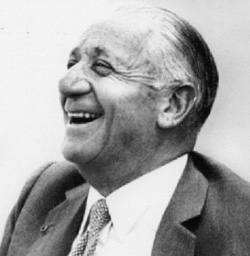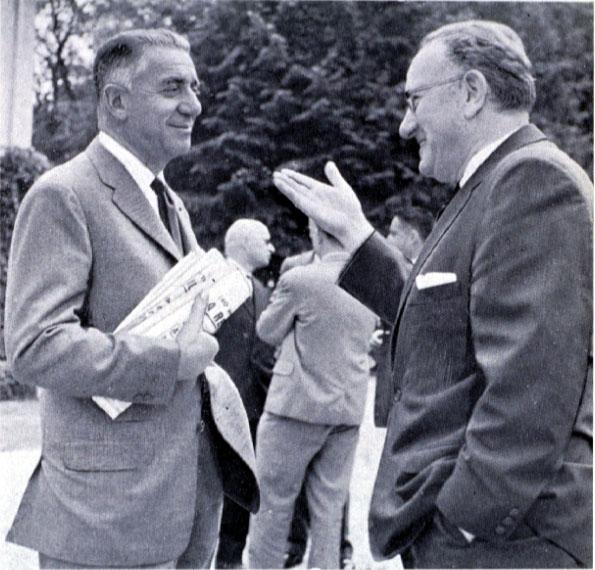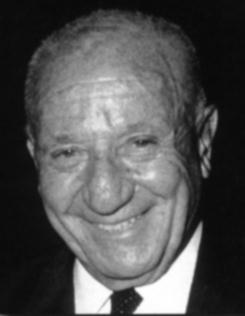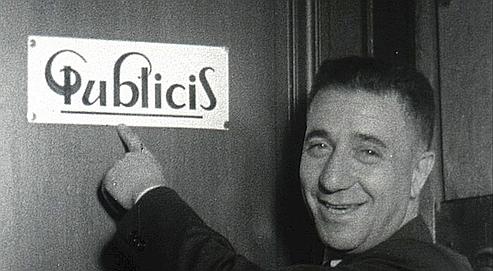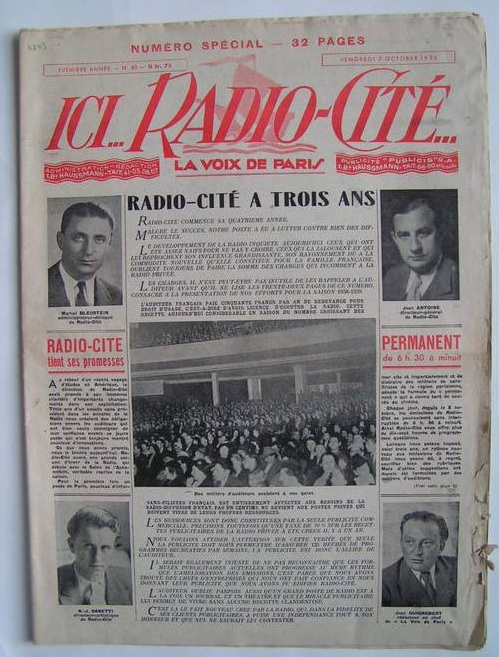Marcel Bleustein-Blanchet
21 de agosto de 1906 - 21 de abril 1996
Marcel Bleustein was born on August 21, 1906, to a family of Russian-Jewish emigrants in a suburb of Paris. Upon completing elementary school, the self-confessed mauvais élève started selling furniture in his father´s business. There the foundations of his business savvy were set as he grew to relish the excitement of a successful sale. His dreams, however, were elsewhere, as he saw a future for himself in advertising. When his father criticized him for wanting to sell "nothing but air" the cocky youngster was quick to respond, "and what makes windmills go round?"
At the age of 20, Bleustein founded Publicis, joining the French words ‘publicité´ (advertising) and ‘six,´ his lucky number. He set up a small office in a working-class neighborhood of Paris, later keeping the door of this office as a reminder of his humble beginnings. Seeking out his first clients, he went door to door presenting the benefits of advertising to skeptical listeners. His first breaks came through family friends: le Comptoir Cardinet, Lévitan furniture, André shoes and Brunswick furs. The chance they took with him quickly paid off as their slogans became known all over France.
Soon after, he ambitiously set out to conquer the new media of the time: radio and cinema. He launched his own radio station, for which he invented the first advertising-sponsored programs, and also started selling advertising in cinemas. In 1938, he launched Régie-Presse, expanding into advertising space in newspapers.
World War II put an abrupt end to all professional activity. Fleeing to London, under the assumed name Blanchet, he joined General de Gaulle, and became press officer to General Koenig, the chief commander of the armed Resistance movement.
Returning to Paris after the Liberation, he became Bleustein-Blanchet. His radio station had been destroyed and commercial radio banned in France, but his determination remained resolute. In 1946, faced with the challenge of rebuilding from scratch, he reopened Publicis on the Champs Elysées, welcoming back his former clients. His staff grew from 20 to 200 over the course of 10 years.
In a country that was once mistrustful of the very idea of advertising, Bleustein-Blanchet was a pioneering figure in getting it recognized as a reputable industry. He set out to make ads that were honest and informative, putting the brand in touch with the consumer. In a pioneering move, he established France´s first market research department and introduced George Gallup and Ernest Dichter´s studies in opinion polling and motivation to advertising.
Bleustein-Blanchet´s charisma and integrity, combined with hard work, propelled the company among the top French agencies. In 1954, Publicis won its first major international client, Colgate-Palmolive, followed by Nescafé-which would lead to a long-term relationship with Nestlé. In 1957, the agency moved to the top of the Champs Elysées right in front of the Arc de Triomphe. In 1958, Bleustein-Blanchet opened the first Publicis Drugstore in Paris. Two years later, as one of several philanthropic activities, Bleustein-Blanchet created the Fondation de la Vocation, to help disadvantaged young people.
On September 27, 1972, the Publicis headquarters went up in flames. The next morning, Bleustein-Blanchet went out onto a neighboring balcony to address his employees on the street below, boldly reassuring them that "Publicis will go on!"
In 1987, Bleustein-Blanchet handed over the executive management of Publicis to Maurice Lévy. On April 21, 1996, when Marcel Bleustein-Blanchet passed away, the entire advertising profession, in France and in the USA, paid homage to the man considered to be the father of French advertising. His daughter Elisabeth Badinter took over as president of the Supervisory Board and built a genuine partnership with Lévy upon which Publicis Groupe´s success developed.
Marcel Bleustein, né le 21 août 1906 à Enghien-les-Bains et mort le 11 avril 1996 à Paris, fut un publicitaire français connu notamment pour avoir créé le groupe Publicis. Il repose au cimetière parisien de Bagneux (4ème Division), auprès de son épouse Sophie Vaillant (1916-1999), petite-fille du communard Edouard Vaillant, dont il eut trois enfants, Marie-Françoise, décédée dans un accident de voiture en 1968 (elle repose dans la même sépulture), Élisabeth Badinter (épouse de Robert Badinter), et Michèle.
Autodidacte, fils d´Abraham Bleustein, un négociant juif en meubles à Enghien-les-Bains, il suivit d´abord, dès l´âge de quatorze ans, les pas de son père en tant que simple vendeur de mobilier sur le boulevard Barbès. Il se lance rapidement dans la publicité (la « réclame » de l´époque) pour fonder Publicis en 1926 dans un petit appartement du Faubourg-Montmartre situé au-dessus d´une boucherie. Il compose le nom de son agence à partir du mot « Publicité » et du dernier chiffre de sa date de naissance, le six. Son père disait « tu vas aller vendre du vent ». Talentueux, il imagine de nombreux slogans dont on voit encore parfois les traces encore aujourd´hui, comme « Dubo, Dubon, Dubonnet » ou « Du pain, du vin, du Boursin ».
En 1935, Marcel Bleustein achète la station de radio privée Radio LL qu´il rebaptise Radio Cité. Il introduit en France le premier journal parlé et permet à Édith Piaf, amenée par Jacques Canetti, alors directeur artistique de la station, de chanter à la radio pour la première fois de sa carrière. C´est aussi l´homme qui inventa les slogans chantés pour la radio. La station confère à Marcel Bleustein un pouvoir considérable et lui permet d´accéder aux plus hautes personnalités de l´État qui saisissent enfin l´importance du médium radiophonique. Lors de l´annexion de l´Autriche par Hitler, le président du Conseil Léon Blum est réveillé en pleine nuit et conduit à Radio Cité pour y effectuer le premier commentaire d´actualité à chaud et en direct de l´histoire de la radio française.
En 1939, la guerre déclarée, Marcel Bleustein épouse Sophie Vaillant, petite-fille d´Édouard Vaillant. Ils auront trois filles :
* Marie-Françoise, décédée dans un accident de voiture en 1968,
* Élisabeth, épouse de Robert Badinter,
* Michèle.
Mobilisé comme pilote d´avion, il participe ensuite à la Résistance sous le pseudonyme de Blanchet. À l´arrivée des Allemands à Paris en juin 1940, il perd Publicis et Radio Cité, déclarées « entreprises juives » par les autorités d´occupation. Sa tête est mise à prix et il prend le nom de Blanchet au cours de son engagement dans la Résistance, qui lui vaudra la Croix de guerre 1939-1945 et le grade de chevalier de la Légion d´honneur. Il sera élevé au grade de commandeur par le général Corniglion-Molinier puis à celui de grand officier par François Mitterrand.
La guerre terminée, Marcel Bleustein-Blanchet (il conserve Blanchet pour des raisons administratives), retrouve Publicis et prend lui-même le téléphone pour appeler ses anciens clients et en prospecter de nouveaux. Tous l´assurent de leur soutien et promettent de revenir « dès qu´ils auront quelque chose à vendre ». Marcel les convainc de communiquer dès lors pour ne pas courir le risque de voir leur concurrents prendre leur place dans le cœur du consommateur. À force de détermination, Bleustein-Blanchet développe rapidement le groupe pour en faire bientôt le numéro un français, puis européen.
En 1956, le New York Times lui consacre un grand article lors de la première implantation de Publicis aux États-Unis. Après sa rencontre avec George Gallup, inventeur des sondages, qu´il a connu avant la guerre à New York, il introduit les enquêtes d´opinion en France et crée à Publicis un département de recherche fondé sur des méthodes américaines révolutionnaires. Grâce à lui, la publicité devient une profession sérieuse et respectée. Il est aussi le premier à lancer en France le concept des drugstores à l´américaine en 1957, dont subsiste le drugstore Publicis sur les Champs-Élysées à Paris. À partir des années 1970, Publicis devient international puis mondial pour devenir, sous l´impulsion de Maurice Lévy, successeur de Marcel Bleustein-Blanchet depuis 1987, le quatrième groupe mondial de communication.
Son œuvre se perpétue également à travers la fondation Bleustein-Blanchet pour la vocation (créée en 1960 sous le nom de Fondation de la Vocation) qui chaque année décerne des bourses à des jeunes gens.
Une émission, La traversée du siècle, tournée en 1988, a été diffusée sur la chaîne TF1 à sa mort, en 1996. Elle est constituée de reportages sur le publicitaire et d´entretiens menés par le journaliste Daniel Schneidermann. Auteur de plusieurs livres, dont Sur mon antenne, La Rage de convaincre, Mémoires d´un lion et La Nostalgie du futur, Marcel Bleustein-Blanchet a été l´invité de nombreuses autres émissions, tant à la radio qu´à la télévision, notamment dans Bouillon de culture de Bernard Pivot et Le Grand Échiquier de Jacques Chancel.
Le 10 janvier 2008, près de douze ans après sa disparition, l´American Advertising Federation (AAF) a annoncé l´entrée de Marcel Bleustein-Blanchet au Advertising Hall of Fame. Bleustein-Blanchet est le premier publicitaire non américain a y être admis aux côtés de légendes de la publicité telles que Leo Burnett, Raymond Rubicam, William Bernbach et George Gallup.
Fuente: wikipedia.org
Marcel Bleustein Blanchet, fundador de Publicis
Marcel Bleustein-Blanchet, fundador del grupo francés de publicidad Publicis, el número dos europeo, falleció el pasado 11 de abril, en su domicilio de París, a los 89 años de edad.Nacido en una familia humilde del barrio parisino de Montmartre, tuvo que abandonar los estudios a los 12 años. Después de trabajar en varios oficios creó Publicis en 1927 y tuvo también un papel destacado en los comienzos de la radio, en donde lanzó los primeros programas de noticias, y también en las primeras encuestas de opinión que aparecieron en Francia.Durante la II Guerra Mundial se incorporó a la resistencia en la Francia ocupada y después pasó a Gran Bretaña a través de España. Allí voló en misiones de combate como piloto de reconocimiento, a pesar de ser demasiado mayor para estas tareas.
También es célebre en su país como propietario de la cadena de almacenes Le Drugstore, que incluyen farmacias, restaurantes, cines y tiendas. Una de sus hijas es la conocida escritora feminista Elisabeth Badinter, casada con el que fue ministro de Justicia con François Mitterrand, Robert Badinter.
Bleustein-Blanchet estuvo activo hasta su muerte. Hace poco apareció en unos anuncios demostrando que los pantalones vaqueros no eran sólo para jóvenes. Continuaba siendo presidente del Consejo de Vigilancia de Publicis y, según informó un portavoz del grupo, "hasta hace diez días acudia cotidianamente a su trabajo".
También era conocido por su labor de mecenazgo de las artes, especialmente del cine. También dirigía varias organizaciones judías de obras benéficas.
Fuente: El País, 15 abril 1996.
Marcel Bleustein-Blanchet Dies; Paris Advertising Giant Was 89
Marcel Bleustein-Blanchet, the grade-school dropout who gave France its first advertising agency, its first radio news programs and its first opinion polls before capping his visionary business career with the startling invention of Le Drugstore, died on Thursday at his home in Paris.
He was 89 and had been active until a few weeks ago as chairman of Publicis, the giant advertising agency he founded as a teen-ager in 1926.
The youngest of the nine children of a poor Jewish emigre from Russia, Mr. Bleustein-Blanchet, whose father eked out a living as a used furniture dealer, grew up in the working-class district of Montmartre dreaming of a better life on the Champs-Elysees.
Forced to leave school at the age of 12 to help support his family, he held a series of jobs until he hit on the idea that would transform his life and the cultural face of France.
Convinced that merchants could use -- and would pay for -- professional help in designing newspaper and other advertisements, at 18 he scraped up enough money to pay for a scouting trip to the United States.
Although he arrived speaking no English, he absorbed so much of the new American advertising technique that when he returned to France the next year, he promptly opened what is regarded as the first French advertising agency.
Operating out of two rented rooms and wearing a black jacket, striped pants and a bowler to make himself appear older than his 19 years, he was soon a familiar figure as he canvassed Montmartre looking for business. It was not until Christmas 1927 that he landed his first client, designing an ad featuring silverware and watches for a neighborhood jewelry store.
Realizing that radio could be a powerful advertising medium, he moved so fast to capitalize on his idea that by 1929 Publicis was the exclusive agent for all 18 Government-run radio stations.
He so saturated the airwaves with commercials that five years later the Government banned advertising on state-run stations.
Mr. Bleustein-Blanchet, who tended to read such setbacks as opportunities, reacted by buying a private station in Paris and transforming it into Radio Cite. It became the first station in France to broadcast from 6 A.M. to midnight and the first to offer contests, commercial jingles, talent searches and on-the-scene news reporting, not to mention the first to broadcast the music of Maurice Chevalier and Edith Piaf.
By 1939 his booming company had expanded into film distribution and even operated a chain of movie theaters, but the outbreak of World War II changed all that.
After serving as an intelligence agent for de Gaulle, Mr. Bleustein-Blanchet fled, one step ahead of Nazi agents, making it safely to Spain by truck hiding under loads of vegetables and coal. Going on to England, Mr. Bleustein-Blanchet, a lifelong aviation buff, flew reconnaissance missions over Germany, returning to Paris for the liberation, only to find that retreating German forces had blown up his radio station a day earlier.
Undeterred as usual, Mr. Bleustein-Blanchet, who liked to boast that he had been a millionaire at 25 and ruined by 40, started over, rebuilding his business into one of the world´s largest advertising agencies with such long-term clients as Renault, Nestle, L´Oreal and Shell.
The success brought the fulfillment of a lifelong dream when he acquired an old hotel that had been used as Allied headquarters in World War II and made it his corporate headquarters, giving him an address on the Champs-Elysees.
In 1988 he put together what he called a grand alliance, teaming up with the American agency Foote, Cone & Belding to form Publicis-FCB, which now operates the second largest advertising network in Europe, with annual billings of $3.3 billion.
For all his success in advertising, he made his most visible contribution to French culture in 1958 when he transformed the ground floor of his headquarters into Le Drugstore, a 24-hour emporium complete with a movie theater, gift shop, soda fountain and even a pharmacy.
The business was such a success, drawing hordes of shoppers during the day and a chic late-night clientele, that he later opened several others in Paris.
But for all its popularity with French shoppers (and tourists),there are those who have never forgiven Mr. Bleustein-Blanchet for what he did to their sacred French language by introducing an ungainly alien term.
Purists were so aghast that the Prime Minister begged him to call it "Bazaar," and a member of the French Academy suggested "Pan." Mr. Bleustein-Blanchet, noting that one word was Turkish and the other Greek, said an American name was good enough for him.
Mr. Bleustein-Blanchet, who became a leading philanthropist with lavish support for the arts and cultural causes, was also highly active in Jewish affairs and an outspoken supporter of Israel.
He is survived by his wife, Sophie; and two daughters, Elisabeth Badinter and Michele Bleustein-Blanchet, and several grandchildren.
Photo: Marcel Bleustein-Blanchet invented Le Drugstore in Paris.(Agence France-Presse, 1989)
Fuente: nytimes.com. ROBERT McG. THOMAS Jr. 13 abril 1996.
The history of advertising in France is unusual. Newspapers were slow to make space for publicity. It was widely held that advertising meant corruption (and so it did when Marcel Proust had to pay both journalist and newspaper in order to get a favourable review). But, just as the French overcame their reluctance to have anything to do with the banks or with the stock exchange, so advertising and publicity have become a vital part of national activities. Were proof needed one has only to look at the eulogies delivered for Marcel Bleustein-Blanchet, on his death at the age of 89. One left-wing journal hailed him on its front page as the Pope of Publicity, "le Pape de la Pub".
Of course, every country is proud of its rags-to-riches citizens. Bleustein, as he was called, was born in 1906 of a Jewish family living in Montmartre. He attended the local school where his main preoccupation was to sit near the stove in winter and near the door in summer. He left as soon as possible carrying with him a certificate which stated that he was able to read, to write and to count. Bleustein never tired of telling the story, always adding that mention should have been made that he was also able to speak. An ability to convince, together with a supreme self- confidence, explains his success.
For a time he worked in the furniture business of Leviten (he was related to the family) and then set up in two small rooms on the Faubourg-Montmartre as a publicity agent. At first it was difficult and he found that possible customers did not know what he was talking about. But he inspired confidence. His agency, Publicis, was founded in 1926 ("cis" for "six", in French) and in 1929 he first had the idea of using the radio for publicity purposes; it was an immense success. Reputedly in this year he became a millionaire.
Bleustein used every method to promote himself. On one occasion he booked a table for dinner in Maxim´s and, when the restaurant was full, he went round all those who were dining there, the smartest of the smart, introduced himself and shook hands. People were puzzled, but informed.
In 1934 the austere Georges Mandel became minister responsible for the Post Office and its services, and he banned all advertising on radio. Bleustein was ruined. But he picked himself up and created his own radio station, Radio Cite. The risk paid off. It was a great success, thanks to the artists who appeared there, including many who were becoming famous, such as Tino Rossi, Charles Trenet, Edith Piaf and Jean Sablon.
And Bleustein was the inventor of the advertising slogan. His phrases were repeated on the radio and throughout France. Many are still remembered. In the days of furs and fur coats, there was the unforgettable "Brunswick, le fourreur qui fait fureur". Bleustein was part of French life.
In 1939 he served in the air force. In 1940 the Germans took over Radio Cite and looked for its owner, who spent some time in a Spanish prison before joining de Gaulle. He then adopted the name of Blanchet and was on the staff of General Koenig, who was one of the first Free French leaders to land in France.
Back in France he brought many Gaullists into the publicity business, although Albert Camus was bitterly disappointed not to have his financial support for a progressive newspaper. Instead, Bleustein-Blanchet collaborated with Pierre Lazareff (with whom he had been at school) for the paper France- Soir. Installed in the buildings of the Hotel Astoria on the Champs-Elysees (which were burned down in 1972 but rebuilt), he knew everyone and was alert to a France that was rapidly changing. Who else would have told de Gaulle in 1958 that he had no idea of how he should appear on television? (And de Gaulle took his advice.) Who else would have installed a drug- store on the Champs-Elysees and in the Latin Quarter?
Bleustein-Blanchet was one of the first to understand the importance of public opinion polls, in commerce and in politics, and he was instrumental in organising what has become a minor industry and an inescapable facet of French life.
In 1939 he married Sophie Vaillant, the granddaughter of Edouard Vaillant, one of the founding fathers of French socialism.
Marcel Bleustein, advertising and publicity entrepreneur: born Paris 1906; married 1939 Sophie Vaillant (three daughters); died Paris 11 April 1996.
Fuente: independent.co.uk. Douglas Johnson. 13 abril 1996.
